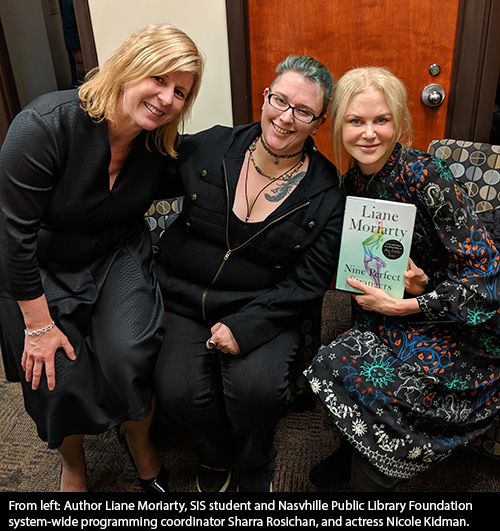SIS Student Sharra Rosichan Uses GIS to Aid Vulnerable Populations
SIS student Sharra Rosichan is the type of person who will teach herself something that she’s interested in – such as how to write code, design websites or read maps.
 She was a voracious reader at a very young age – reading before talking, and consuming chapter books by the time she was four years old, she said. It was only natural that she would later end up working for a library system and getting her degree in information sciences.
She was a voracious reader at a very young age – reading before talking, and consuming chapter books by the time she was four years old, she said. It was only natural that she would later end up working for a library system and getting her degree in information sciences.
Rosichan is the system-wide programming coordinator for the Nashville Public Library Foundation, and she oversees and creates a variety of events for the area the system serves. This includes art month in October, a celebration of diversity in April, African-American history month, Hispanic heritage, a citywide read, and more. She also does statistics, data entry and program scheduling.
Working for the library wasn’t her initial choice of career; Rosichan earned her bachelor’s degree in psychology, and almost finished her master’s in the same field.
“If I had to pick a job besides psychology it would be working in a library, and during my psychology practicum, I realized I could do more good working in a library than I could working in psychology,” Rosichan said. “I felt like I could do more for more people with the library, but I picked information sciences for a few reasons. I’m self-taught on a lot of technology, I taught myself programming languages and can build websites, which helps with my job, but I needed more official training.”
She said she especially appreciated the information technology classes that are offered, such as database management, website design and geospatial technology – the latter of which led to a project that Rosichan is excited to implement as part of her job.
It was her lifelong interest in maps that led her to take the Geospatial Technologies class from SIS Associate Professor Wade Bishop.
“One of the things I ran into with this job is we do a lot of reports and we’re always looking for more creative ways to display the information that we’re providing,” she said. “When I found out I could use GIS to do spatial analysis for the libraries, I got really excited about it. When I took the class, I didn’t realize that at first, it sounded cool, but it expanded from there.”
For her project, Rosichan took census data such as poverty levels, and level of education attainment, and cross-referenced it with the adult literacy services offered by NPLF. This was specifically to see where adult literacy programs and assistance are most needed. While the Foundation has a lot of outreach programs, there was so much data to wade through, she decided to narrow it down to just one.
The work she did on the project made an impression on Bishop.
“Sharra is amazing. She was able to use the tools learned in the program and 516 (Geospatial Technologies) to dust off a messy spreadsheet and transform it into a geodatabase that brought the public library data to life through mapping,” Bishop said. “For whatever reasons, when people see data on a map, they understand it more easily. It isn’t just figures and stats any longer, but an a-ha moment of ‘wow, we don’t have a library there or even any programming and the adult literacy rate is the lowest in the county.’ Then, decision makers and other stakeholders can make a real difference about how to allocate resources based on needs and a map helps make the argument for future grant funding as well.”
This project – which can help pinpoint populations that need certain services the most – is exactly the type of work that Rosichan wanted to do when she left psychology for libraries.
Technically, she was working in a gas station and volunteering at the library before she applied for her current position. She did such a great job volunteering on a database that was supposed to take months – she did it in less than a month – that the employee overseeing that project strongly recommended Rosichan for the position. It was a brand-new position, and she’s found ways to build and grow it to help the people who most need it.
“At the library, services are available for everybody. It doesn’t matter your race, your creed, your income level, and it’s more than just coming in and checking out books. It’s a community and it’s a place for learning that we try to make as accessible as possible,” she said.
Rosichan graduates in spring 2019, and she’s ready to continue putting her new knowledge to work. She plans to sit down with the adult literacy outreach program organizers and find out exactly the best data to use in order to better represent their goals through maps. After that, she’ll continue using the process.
“Eventually the hope is that I’d be able to do this for other outreach services on a more detailed basis, and be more specific rather than broader,” she said.